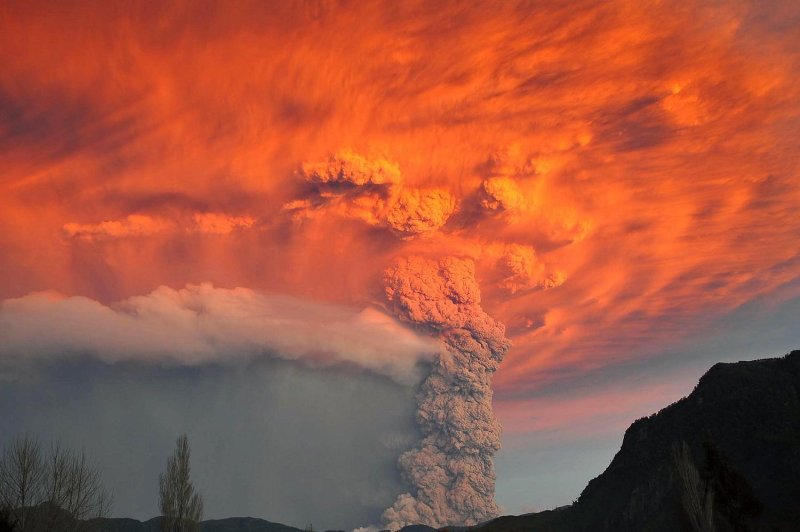A volcano in southern Chile, some 600 miles south of Santiago, erupts for a second day on June 5, 2011, shooting out a cloud of ash six miles high. Residents evacuated from the Puyehue-Cordón Caulle volcano complex area, and there have been no injuries. UPI/Miguel Angel Bustos
|
License Photo
BUENOS AIRES, June 8 (UPI) -- Volcanic ash spewed out of Chilean volcano Puyehue and sparked health and safety alerts across Chile, Argentina, Brazil and Uruguay and possibly other Latin American countries.
Emergency and rescue officials in the affected countries said the ash clouds began to disperse Wednesday but information about the numbers of people affected by the polluted air remained scarce.
No serious injuries were immediately reported and the numbers of those needing hospitalization or medical treatment varied in media reports on the ash crisis, which began Saturday with an eruption in Chile's Puyehue-Cordon Caulle volcanic range.
Chilean authorities evacuated more than 3,500 inhabitants of nearby hillside villages and towns and rescue teams in Argentina ordered further evacuations. Several airports were shut as the thick ash cloud moved over Argentina and parts of Brazil and Uruguay.
Officials said several dozen tremors followed the eruptions, the strongest in the volcanic range since 1960, when major eruptions devastated communities, including several that had been battered days earlier in a 9.5-magnitude earthquake, the strongest ever recorded.
Officials warned the thick layers of ash continued to pose a major health risk. They said the ash also posed danger to rivers that could be silted as the ash settled and caused rivers to overflow, triggering floods.
Geological and weather experts said the weight of falling water and volcanic materials could cause mudslides and threaten dams in the area.
"We are concerned about water that can drag the volcanic material certain places and cause some dams to fall," Chilean Public Works Minister Hernan de Soliminhac said in published comments, MercoPress reported.
Enrique Valdivieso, director of Chile's National Service of Geology and Mines warned that heavy rains that accompanied the eruptions could bring gases and ash to the surface and contaminate nearby rivers.
Valdivieso said that although eruptions have slowed there is still the risk of large amounts of sediment pouring down and choking rivers and dams.
Officials warned of developing health risks. Volcanic ash has devastating effect on the breathing apparatus of all living creatures and grim histories of past eruptions list hundreds of deaths from the effects of volcanic ash.
Chile is one of the most volcanic countries on the planet and has more than 3,000 volcanoes, about 80 of those believed by experts to be active.
There was widespread panic over the settling ash in Buenos Aires and in Montevideo, the Uruguayan capital. Most Patagonia airports remain closed even as ash is seen to be dispersing from the region.
Passengers hoping to travel found themselves stranded in ash-coated airports that shut as travelers and residents reported severe breathing difficulties.
Numerous international flights to destinations in Central and North America, Europe and other parts of the world were among air services hit across the region.
Officials said tourism industry outlets in the affected countries faced severe losses but business and commercial disruptions were also widespread.
The resort of Bariloche, about 60 miles east of the erupting volcano in Argentina's Rio Negro province, was one of the most affected areas.





